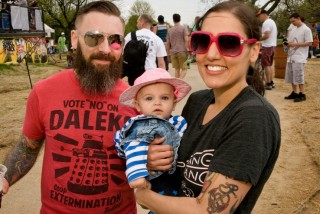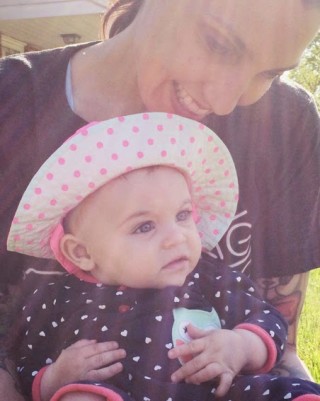 I decided that I would rather struggle with anxiety than worry I was potentially harming the baby by staying on my medication. I am not judgmental of women who decide otherwise, but weaning off my medication was the best individual decision for me.
I decided that I would rather struggle with anxiety than worry I was potentially harming the baby by staying on my medication. I am not judgmental of women who decide otherwise, but weaning off my medication was the best individual decision for me.
I was so grateful and surprised that I felt better than ever during my pregnancy (even better than when I was taking medication). Of course, as an anxious person, there was always the thought in the back of my head that the other shoe would drop eventually, and that there would be a point where my anxiety would become overwhelming again, that I would experience post-partum depression.
Mental illness is a very self-centered disease; you’re constantly in your head, thinking or worrying about yourself and what’s happening to or around you, and I looked forward to having a child to concentrate on, to take some of that self-centeredness away from me.
Concerns and coping
During my pregnancy, I was concerned that, off my medication, I would be so anxious that I’d be unable to function both professionally, and at home. I was worried I’d have panic attacks that would harm the baby (I did, in fact, have one huge panic attack about six months into my pregnancy, and remember apologizing to the baby in my head as I was experiencing all of the intense physical symptoms).
I was worried (and still am) that I would pass my mental illness down to my daughter, and often questioned whether someone “like me” should even have a child and whether or not it is fair to bring a child into the world who might suffer mentally in the future. I also worried that the anorexia I experienced in my teens would be triggered by my weight gain, and that I’d end up reverting back to more self-destructive behaviors like substance abuse.
During my pregnancy, I made sure I attended all of my appointments with my therapist and other doctors, even when I was exhausted or felt like I was doing “OK” and there wasn’t much to talk about.
Now, exercise for me is the key element to feeling physically and mentally balanced. Tiring myself out before bedtime with a regular exercise routine that is both physically and mentally challenging is probably my single biggest coping mechanism. Also, over the years, I’ve gotten to know my anxiety well, and make a concentrated effort to stay away from anxiety-inducing situations (which for me, are mainly social situations like speaking in front of large groups, crowded parties...). Sometimes, they cannot be avoided, but I’ve learned how to handle them better now, mainly through positive self-talk (i.e. this will all be over soon, you’ve made it through before, nothing truly bad has ever happened in this scenario…).
Support, sensitivity, and communication breakdowns
My family was very supportive throughout my pregnancy, especially my husband, who struggles with anxiety as well. He was of course, concerned that I would possibly not be able to handle my anxiety unmedicated, but we were lucky to both have a fairly peaceful and centered nine months.
My therapist and psychiatrist were supportive, although my OB-GYN (who is high-risk and supposed to be sensitive to and trained in dealing with situations like this) was not. She told me very flippantly with a wave of her hand in an early appointment that “all women are anxious.” In retrospect, I wish I had chosen a midwife/birthing center versus an OB/hospital because I feel like they would’ve been more positive and attuned, but I was led to believe that I needed a high-risk OB-GYN due to my age and history of mental illness. She was not a “bad” doctor per se. In fact, she is one of the most respected high-risk OB’s in the area. She was just dismissive of my concerns related to anxiety, and the potential impact it could have both during pregnancy and after birth.
What I found was that no one seems to want to take ownership, or tell you exactly what to do (lest something goes awry and they are blamed). All I ever wanted was some guidance and assistance in making these huge decisions, and I felt like I never really got that. And, even the most caring and informed of OB-GYNs and mental health professionals seemed to take the opposite approach from one another – the OB was ultimately concerned with the health of the baby, and the mental health professional with my mental state.
There is a communication breakdown and lack of teamwork among groups of caregivers (OB, therapist, psychiatrist). Each doctor is working in a silo, and although you cannot expect an OB to be a mental health expert, or vice versa, there can be a much better system in place for sharing information and ideas related to patient care.
My advice to other women going through a similar experience would be to research and educate yourself as much as possible, and then surround yourself with a team of healthcare providers whom you trust, and who are willing to help guide you in your decision making process. It is also equally as important to surround yourself with a support system of friends and family members who understand what you are going through, or are at least there to listen and try to help. I could not have done this without such a supportive husband, during pregnancy, but especially in all that he does now to share in taking care of our daughter, and take on some of the overwhelming physical and mental burden on a daily basis.
Anxiety doesn’t own you
Personally, I have learned that I am much stronger, mentally, than I thought I was. I ended up having a very positive pregnancy experience, and I was able to prove to myself that I am not that broken, anxious, mentally ill, “crazy person” which I identified with in my 20s and built a persona around. I’ve proven to myself that my anxiety doesn't need to take precedence in my life as much as it has in the past. I've allowed it to prevent me from doing things. I've allowed it to make me feel a certain way about myself, as somebody who is screwed up, or unable to function or handle life in a positive and productive way. I have a lot more confidence in my mental strength and my ability to meet and overcome challenges in all areas of my life now.
I’ve also learned how important it is to take care of yourself afterwards. There is pressure to be an “ideal parent.” You are given a lot of advice, a lot of perfect ways to do things (related to breastfeeding, sleeping, etc.) that can take a toll and doesn't really consider the mental or physical health of the mother so much. You're supposed to be this woman who’s making a major sacrifice for their child while almost ignoring your own needs.
I quickly learned that there is a much more practical way to parent, to loosen up a little bit, to not feel so guilty. If I need to give my daughter a pacifier at night so that she'll fall asleep, that is better for both of us, because it enables me to get some rest and be a better mom to her the next day. I can’t do everything perfectly and I can't follow everything by the book 100% every day, but I'm taking the best care of her that I possibly can, and prioritizing her while also taking care of myself at the same time.
I also find myself being less of a perfectionist, and kinder with myself in terms of work and accomplishments. I’m obsessive, a workaholic, and extremely ambitious, which has often been detrimental to my mental and physical state, and I feel like I’m doing a good job of allowing myself to take a break and focus on the basics, like eating and sleeping well, and being as healthy and calm as I possibly can for my baby.
Society leads women to believe that they need to sacrifice their career for family (or vice versa). I have recently returned to work full time, and it is very overwhelming and utterly exhausting, but I’m feeling confident that I can handle both.
About Dina
Dina Fiasconaro has an MFA in filmmaking from Columbia University, and a BS in TV, Radio and Film from Syracuse University. Her short films and screenplays have been the recipient of multiple grants and awards, and her films have screened at a variety of festivals nationwide. Dina is currently an Assistant Professor of Film and Video at Stevenson University, near Baltimore, MD.


